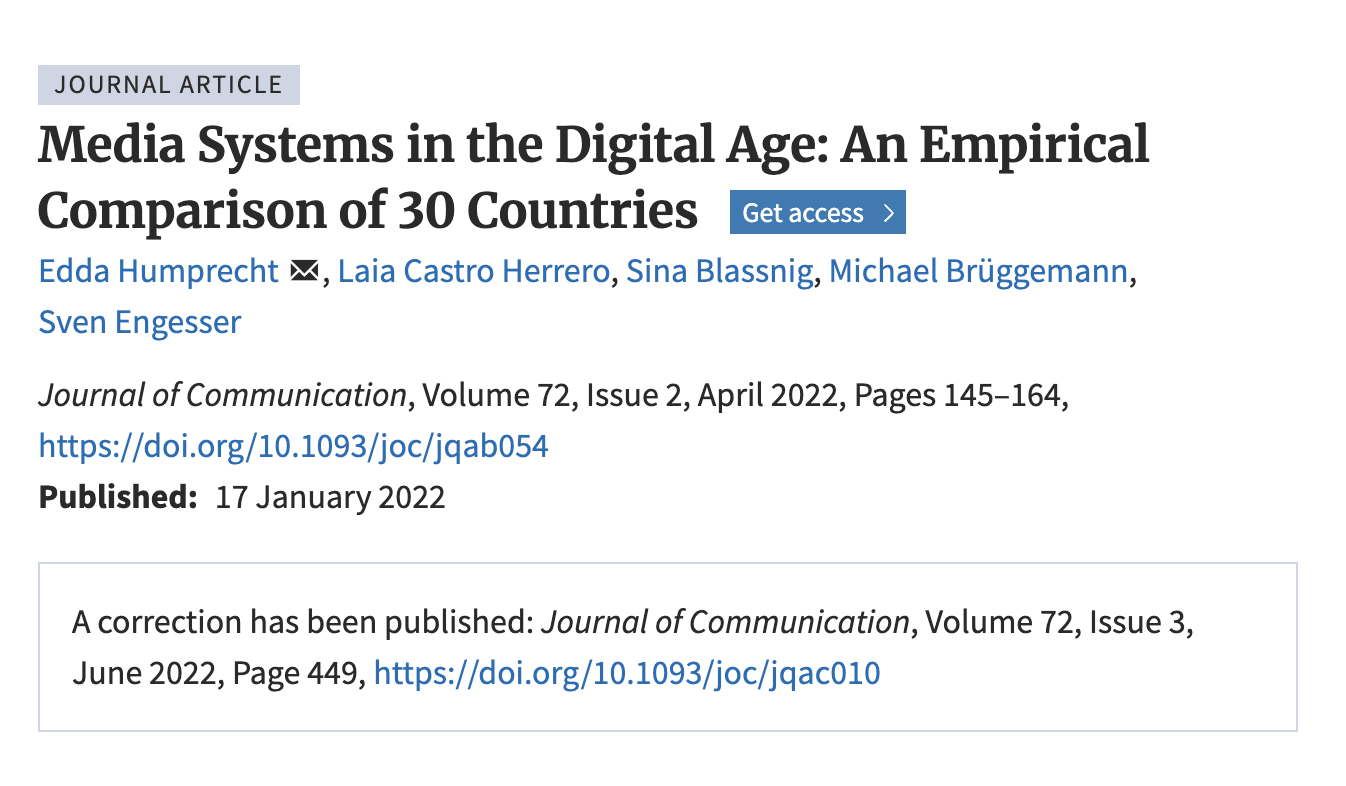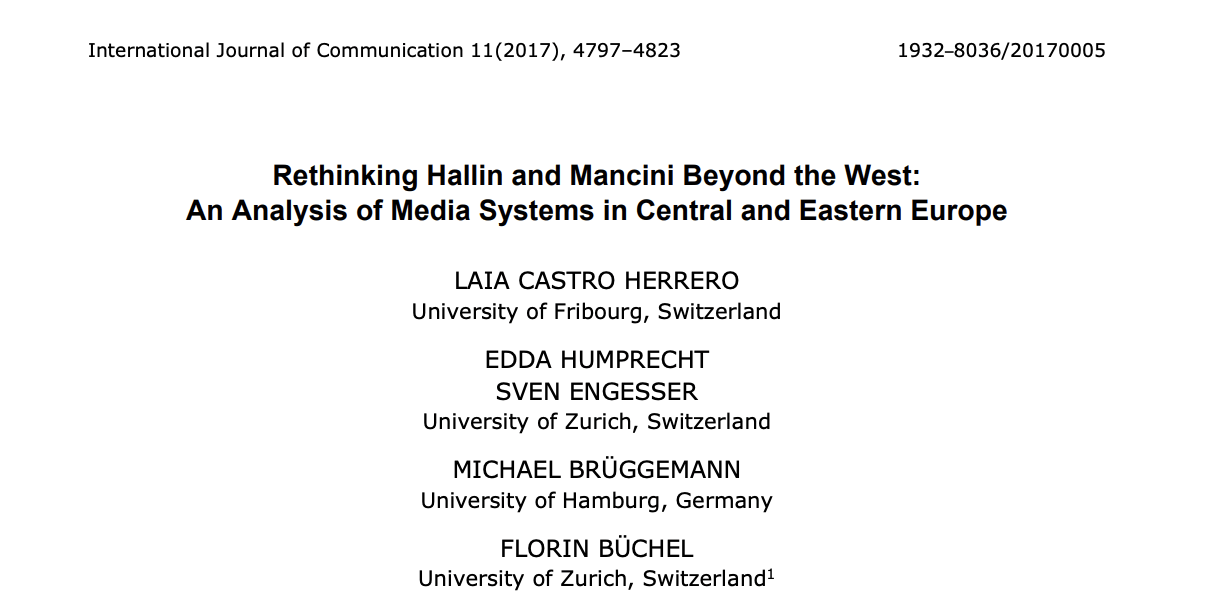Media, Systems, Norms
Norms, Systems, Media
Systems, Media, Norms
Media, Norms, Systems
Norms, Media, Systems
why I?
observation/assumption
political system
media system
political system
?
norms?
traditions?
unexpected event? (war, revolution, crisis)
what do we expect from an ideal media system?
how the media should operate?
what are the main roles of journalism?
expectations vs. reality
how can it be that everyone can formulate expectations of the media on more or less correct moral grounds, yet the media fail to meet these expectations?
What is the reason, explanation to this?
politics
media
society
Siebert, Peterson and Schramm: The Four Theories of The Press

Wilbur Schramm: journalist, literary critic, then academic (UI, Stanford)
Fred Siebert: political scientist, journalist, then academic
Theodore Peterson: journalism and media historian
1956: Cold War, anti-Communist witch-hunting in the US
authoritarian
libertarian
Soviet-communist
socially responsible
| Dimension | Authoritarian | Libertarian | Socially Responsible | Soviet-totalitarian |
|---|---|---|---|---|
| Developed (where/when?) |
|
|||
| Out of (philosophical background) |
|
|||
| Chief purpose? |
|
|||
| Who has right? |
|
|||
| How are the media controlled? | ||||
| What is forbidden? |
|
|||
| Ownership? |
|
|||
| Essence? |
|
| Dimension | Authoritarian | Libertarian | Socially Responsible | Soviet-totalitarian |
|---|---|---|---|---|
| Developed | 16th, 17th century England | 17th century England, 18th century USA | 20th century USA | USSR |
| Out of | Absolute power of the monarch | General philosphy of rationalism and natural rights / Milton, Mills | Commission of Freedom of Press, self regulatory codes | Marxism-Leninism, Hegelism |
| Chief purpose | Support of the monarch/government | Inform, entertain, sell, discover the truth, check the government | inform, entertain, sell, raise awareness, giving voice to the powerless | Contribution to the success of the dictator |
| Who has right | Who has royal patent or permission | Anyone with economic means | Everyone who has something to say | Loyals to the dictator and to the party |
| How are the media controlled? | by government patents, guilds, license, censorship | self regulation, free market, courts | self regulation, ethics, consumer action | surveillance, political and economic influence on the press |
| What is forbidden? | criticism of the monarch and its decisions | defamation, obscenity, indecency | invasion of private and human rights, and vital social interests | criticism of the dictator and party objectives |
| Ownership | Private or public | Mostly private | Mostly private | Public |
| Essence | Instrument of effecting government policy | Checking the government | Assume obligation of social responsibility | Arm of state |
study of the relation between politics, media and norms

socially responsible
libertarian =

leftist/neomarxist criticism
Ben Bagdikian: The Media Monopoly, 1983
Herbert Altschull: Agents of Power, 1984
Noam Chomsky, Edward Herman: Manufacturing Consent, 1988
Robert McChesney: Rich Media, Poor Democracy, 1999
libertarian criticism
John C. Merril: The Imperative of Freedom, 1974
"5th theory"
Robert G. Picard: The Press and the Decline of Democracy: The Democratic Socialist Response in Public Policy, 1985
study of the relation between politics, media and norms

as a bad theoretical framework
James Curran and Jean Seaton: Power Without Responsibility, 1981
Denis McQuail: Mass Communication Theory, 1983, 1994
John Nerone: The Last Rights, 1995
Jonathan Hardy: Western Media Systems, 2008

Daniel C. Hallin, Paolo Mancini: Comparing Media Systems, 2004
three models of media and politics
Polarized-Pluralist, Democratic Corporatist, Liberal
political parallelism, market structure, role of the state, inner-outer pluralism
convergence-thesis

Daniel C. Hallin, Paolo Mancini: Comparing Media Systems, 2004
Hallin: Berkeley, Phd, political science, UC San Diego
Mancini: Perugia, communication and media research
1984: first joint work: "Speaking of the President"
1998: Conference at Berkeley
Several attempts to go beyond the 'Four Theories' (Picard, Curran, Blumler, etc.)
Published in 2004
Setup: 18 Western Democratic Countries
Not testing theories but building theories based upon data
Four Theories: inadequate framework, lacking real empirical basis, weak concepts and typologies.
already outdated
Proposal: new framework
1) development of the media market (strength of the printed press)
2) political parallelism: not only political influence, but how the media market mirrors the political landscape
3) journalistic professionalism
4) level of state intervention
concepts and dimensions
-
market structure: readership, audience, 'quality' press, circulation
-
-
political parallelism: old concept (Seymour-Ure, Gurevitch). More than party-press parallelism. Does the press reflect the complexity of the political/ideological market? external and internal parallelism.
-
-
different models of broadcast regulation: government, professional, parliamentary, civic-corporatist
-
-
professionalization: autonomy, norms, public service, instrumentalization
-
-
state intervention/regulation: how and to what extent the state regulates the press? freedoms, limitations, obligations
-
-
differentiation theory
-
-
convergence/homogenization: all media models in Europe will converge towards the liberal media model
| Dimension | Mediterranean or Polarized Pluralist | Northern-European or Democratic Corporatist | North-Atlantic Liberal |
|---|---|---|---|
| Where | France, Spain, Greece, Italy, Portugal | Austria, Belgium, Denmark, Germany, Sweden, Netherlands, France | GBR, USA, Ireland, Canada |
| Newspaper industry |
|
||
| Political parallelism |
|
|
|
| Professionalization |
|
||
| Role of the state |
|
| Dimension | Mediterranean or Polarized Pluralist | Northern-European or Democratic Corporatist | North-Atlantic Liberal |
|---|---|---|---|
| Where | France, Spain, Greece, Italy, Portugal | Austria, Belgium, Denmark, Germany, Sweden, Netherlands, France | GBR, USA, Ireland, Canada |
| Newspaper industry | Low circulation, elite and politically oriented press | High circulation, early developed mass-circulation press | Medium circulation, early adopted mass and commercial press |
| Political parallelism | High political parallelism, external pluralism, commentary-journalism, parliamentary/government model of broadcasting | Historically strong party press, shift towards neutral commercial press, politics in broadcasting with substantial autonomy | Neutral commercial press, information oriented journalism, internal pluralism |
| Professionalization | Weak, instrumentalization | Strong professionalization, institutionalized self regulation | Strong, noninstitutionalized self regulation |
| Role of the state | Strong, state subsidies of the press, periods of censorship, deregulation | Strong with protection of press freedom, state subsidies, strong PSM | Market-dominated media, strong PSM in GBR and Ireland |

Criticism
One of the most influential bestsellers in media theory, but
Euroatlantic focus
Newspaper industry
Optimism, not realism - convergence
Hybrid systems, not homogeneous
Media concentration


















Media Systems in Central Eastern Europe
Preludes: at least 3 waves of studying media systems in CEE
1990–1998: fall of communism, 3rd wave democratic transitions, privatization, market capitalization, "imitation", "idealistic" "mimetic", "atavistic" transformation, different media politics. Berlusconization, elite driven transformation, underground intellectuals, privatization, nomenklatura
2000–2010: Within the EU, consolidation, adoption, relatively peaceful, false Westernization, disappointment, oligarchization
2010-: new authoritarian, illiberal tendencies, de-Westernization, Orbanization of the Western media? "Hungarian patient"
After "Comparing Media Systems" in 2004. Dumping on books and theories in CEE region
Splichal, Wyka, Jakubowitz: Italianization/Mediterranean Model
Skolkay: Gaullisation
Pereira: Iberian model
Dobek Ostrowska, Voltmer, Mungiu-Pippidi, Balcytiené - CEE is unique
Mancini: Hybridization of Western and Eastern models
"Polish School": Karol Jakubowicz, Tomasz Globan-Klas, Beata Klimkiewitz, Angelika Wyka, Michal Glowacki, Maciej Mrozowski, Dobek-Ostrowska
Hungarian Scholars: Sükösd, Bajomi-Lázár, Polyák (Mérték), Bátorfy
Slovenians: Splichal, Sabina Mihejl, Perusko
Romanians: Mungiu-Pippidi, Dragomir
Czech, Slovakian: Stetka, Metyková, Skolkay

Dobek-Ostrowska: University of Wroclaw, political scientist
Many publications before the book
Definition of CEE?
Political and geographic terms?
In-between Germany and Russia(n)
European 3rd wave democracies, post-Communist/Socialist countries, Including Balkans (Zizek definition)
21 countries
Different indicators, 4 groups according to democratic indicators
| Dimensions | Hybrid-liberal | Politicized | Transitional | Authoritarian |
|---|---|---|---|---|
| where? | Czechia, Poland, Estonia, Lithuania, Latvia, Slovakia, Slovenia | Hungary, Croatia, Bulgaria, Romania, Serbia | Albania, Bosnia and Herzegovina, Kosovo, Montenegro, Macedonia, Moldova, Ukraine | Russia, Belarus |
| Main features | - High scores on democracy and press rankings - stable political system - strong market, independent from the state, - high level of foreign ownership and multinational companies, - political independency |
- decreasing scroes - strong party-press - increasing government interference - lower democratic engagement - weak professionalisation, partisan journalism, low standards - oligarchisation - corruption |
- poor countries - low scores - political instability - weak oppoisitions - oligarchization - strong links between the political and the economic elite - few independent media, many times in the role of the opposition |
- political and economic elite is the same - strong government/state control - censorship - no independent media - surveillance - physical threats - imprisonment |